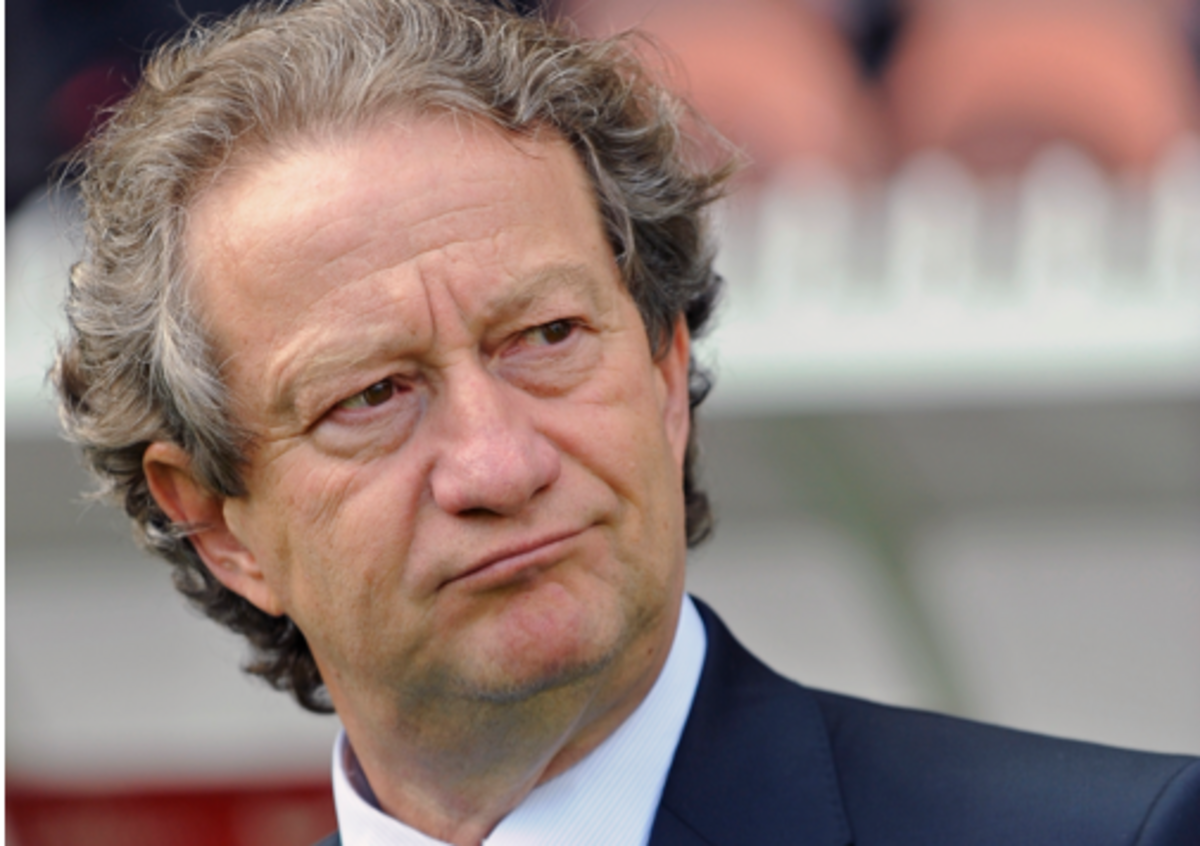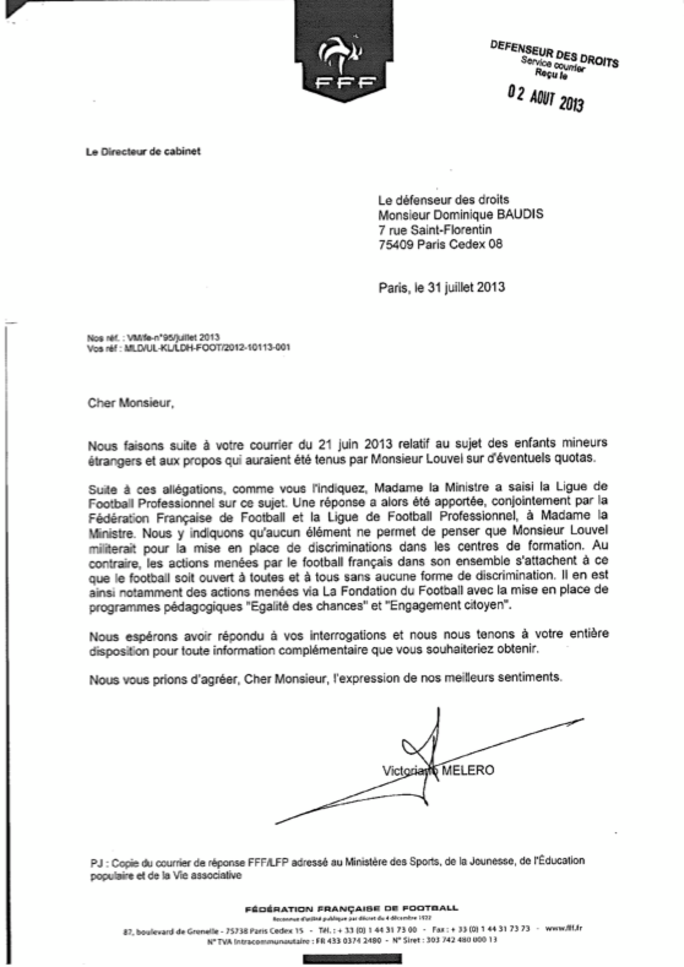The French Football Federation (FFF) has made clear that it intends taking no action over a statement by one of the sport’s leading officials that French professional clubs broadly apply illegal ethnic quotas when recruiting players to their teams, Mediapart can reveal.
The comments by Jean-Pierre Louvel, chairman of France’s Union of Professional Football Clubs, (UCPF), follow separate revelations by Mediapart in 2011 of a secret plan by FFF senior directors to introduce ethnic quotas limiting the number of black and Arab youths entering the France national team’s training academies.
“Let’s stop being hypocrites, and not one [club] chairman would dare say the opposite, this story about quotas, it’s nothing compared to the reality,” Louvel said, referring to Mediapart’s revelations in 2011, during an interview with RMC radio journalist Daniel Riolo.

“We all look closely at who comes into our clubs today. All the clubs apply doses and so, in a way, quotas: not too much of this or that […] the tacit quota exists. To deny it would be absurd,” he added.
The comments by Louvel, whose organisation represents the interests of the owners of 45 clubs in France, were published earlier this year in Riolo’s book Racaille Football Club, which dresses a portrait of French football practices. He confirmed and further developed those comments in a subsequent interview with Mediapart published in June.
“Yes, there are discussions in clubs all the time during which there can be extreme positions [expressed],” Louvel told Mediapart. “I don’t see where the problem is. If you have in a club 60%, even 80%, of players who are of African origin, it’s not a bad thing in itself, but that signifies putting aside people who are not of their culture. The social life of the club is no longer the same.”
Louvel spoke of a problem of “chants”, and “the human relations of Africans”, explaining that “there are, for example, players who come from dominant tribes and, as a result, it is they who decide and not the others.”
Contacted in June by Mediapart, the chairman of the FFF, Noël Le Graët said he “couldn’t give a damn” about the issue, adding “I don’t want to talk about it”. Also contacted, Frédéric Thiriez, president of the French professional football league (LFP), which manages the organization of France’s top two professional leagues, refused to answer Mediapart’s questions despite repeated requests for a response.
However, Louvel’s comments were met with outrage from French sports minister Valérie Fourneyron, who described them as being “of another age”. Above all, they prompted separate demands by both Fourneyron and the official French citizens’ rights ombudsman, Dominique Baudis, for the French Football Federation to make clear its position on Louvel’s claims that ethnic quotas are applied on a widespread basis by French professional clubs.
If confirmed, the clubs would be open to prosecution for practicing illegal discrimination.
The ombudsman wrote to the FFF on June 21st, four days after Mediapart published its interview with Louvel, demanding an explanation over the latter’s claim that “tacit quotas based on nationality and/or origins” were practiced. The FFF finally responded in a letter dated July 31st, and to which Mediapart has now gained access.
“We are responding to your letter of June 21st 2013 relating to the subject of foreign minors and to the comments that Monsieur Louvel is supposed to have made concerning eventual quotas,” began the letter (see below), signed by Victoriano Melero, chief-of-staff to FFF chairman Le Graët

Enlargement : Illustration 2

It then refers the ombudsman to an earlier response by the FFF and the LFP to sports minister Valérie Fourneyron. “We indicated in that that no element allows to believe that Monsieur Louvel would be campaigning for the application of discrimination in training centres,” wrote Melero. “On the contrary,” Melero continued, “the actions led by French football in its entirety are attached to [the effort for] football being open to all without any form of discrimination. It is thus notably concerning the actions led via The Football Foundation with the establishment of the pedagogic programmes ‘Equality of opportunity’ and ‘Citizen’s engagement’.
“We hope to have answered your questions and we remain at your entire disposition for any further information you may wish to obtain.”
Whilst the letter is patently more polite than the response FFF chairman Noël Le Graët gave to Mediapart in June, it was also just as clearly dismissive of any concern over the highly-charged comment by Louvel, one of French football’s leading officials, that “all the clubs” employed quotas and that “to deny it would be absurd”.
In making clear it supported Louvel, the FFF offered no criticism of the views he expressed, and even threw doubt on the veracity of the quotes of his comments.
The attitude of the FFF echoes the reaction to Mediapart’s revelations in May 2011 of a discussion by members of the FFF’s technical board (DTN), in which national technical director François Blaquart, along with the then coach of the France international team, Laurent Blanc, and others set out a secret plan for an ethnic quota limiting the number of black and Arab youths entering its training academies.
Mediapart published a transcript of the meeting, in which Blaquart proposed that "we could trace, on a non-spoken basis, a sort of quota,” adding: “But it must not be said. It stays as action only." Blanc told the assembly: "I'm going to give you the example of the Spanish. They don't have these problems [...] The Spanish, they told me ‘we don't have a problem. Us, we don't have any blacks'."
Erick Mombaerts, then coach of the U21 year-olds national team, now manager of Ligue 2 side Le Havre, argued that "there are clubs like Lyon who do it in their training academies. They do it systematically [...] they can't stand it anymore."
After the disclosures, Blaquart was suspended from his post only to be reinstated later. Laurent Blanc, who was forced to make a public apology for his statements - after first denying he had made - remained in his job as France coach until 2012.
The then-sports minister, Chantal Jouanno, described the comments made at the FFF meeting as being “at the limit of a drift towards racism”. Amid the public and political outrage, the FFF commissioned a report into the scandal by French Member of Parliament Patrick Braouezec, in which the MP denounced the notion that “children of 12 years of age, French, could see themselves refused entry into the national training centres for reasons of a double form [ethnic origin and physical appearance] of discrimination”.
Officially, the meeting of the FFF’s technical board in 2011 was called to discuss the problem of players with dual nationality, a status that can be obtained by those from an immigrant family background, who may receive thorough professional training in French football academies, and then opt to join the national team of another country instead of that of France.
-------------------------
English version by Graham Tearse


